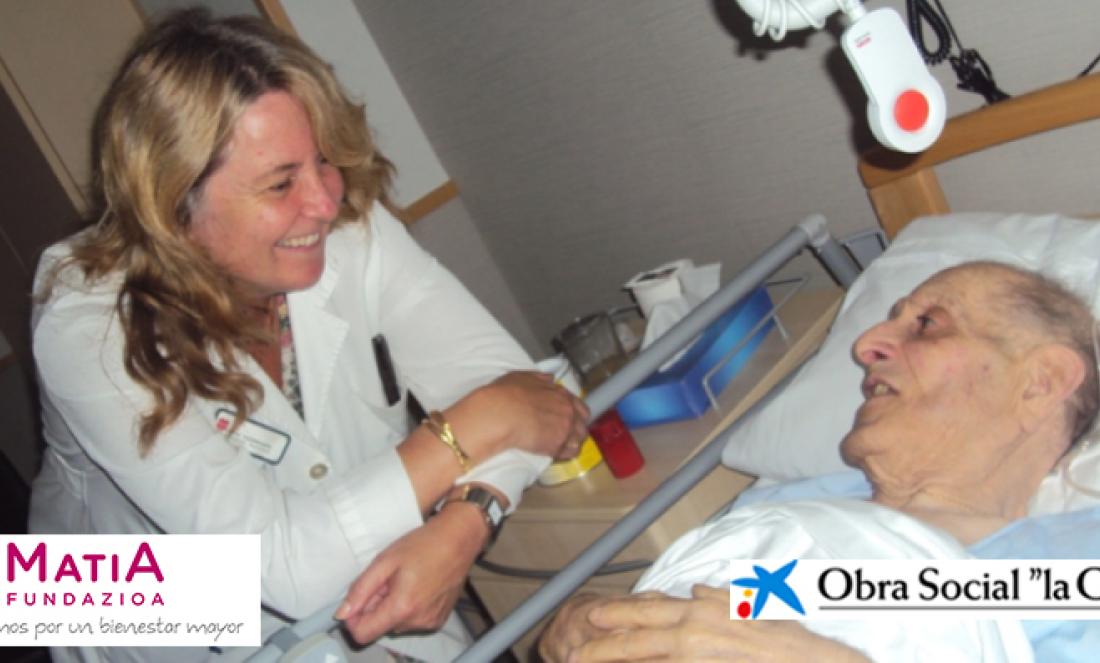
The Programme for the Integral Care of People with Advanced Diseases from a Personal Perspective
Today we presented at Matia Fundazioa the balance sheet of The Programme for the Integral Care of People with Advanced Diseases of "la Caixa" Welfare Projects offers specialised psychological, social and spiritual care to people with advanced diseases and their families. A pioneering project that operates throughout Spain through 29 teams and has already attended to over 100,000 people.
In Gipuzkoa, the Programme is carried out by Matia Fundazioa, through a team of professionals with a multidisciplinary character. To date, we have attended 1,310 patients and 2,248 family members in the territory through the Ricardo Bermingham Hospital, the Donostia University Hospital, the Mendaro Hospital and the home hospitalisation services in Donostia, Mendaro and Bidasoa.
The service offered by the Programme for the Comprehensive Care of People with Advanced Diseases is divided into three areas:
- Attention to patients and their families during the illness, both in hospital and at home and in outpatients
- Individual and group bereavement follow-up
- Emotional support and training for professional teams
- Accompaniment of the people assisted, thanks to the collaboration of the volunteers
We could place greater emphasis on the technical characteristics of the programme and the results obtained, but today we have decided to give the floor to people who have participated in the programme so that they can tell us about the programme from their own experience:
C.U. Patient participating in the Programme
For me it is being essential to live day by day with my illness. From the moment you are told that you have cancer, the world comes to you and a host of emotions that you don't know how to handle. The situation surpasses you, you feel fear, anxiety, anger and all this makes you feel bad but you don't know what to do.
This is where the work of the psychologist is essential.
He guides you, helps you to put a name and identify what you are feeling. It is not that you stop feeling the emotions that cause you discomfort, but by identifying them and allowing yourself to feel them, in all their rawness, many times, it is as if they were lowered in intensity, as if you were incorporating them into your current life.
We are a whole and as such we must attend to all aspects, not only the medical part with its tests and treatments but also the emotional part which helps you to feel more well-being and inner peace, to assume what is happening to you.
Because all of life changes, at the stroke of a pen, the personal, the professional and the social, and you have to adapt to all of the changes that come along and all of the phases that you go through. In general we don't know how to handle emotions.
The psychologist guides you and helps you to get to know yourself better, to learn to recognise emotions, to work through and accept losses, to value yourself as a person who continues to be with an illness, yes, but you are not just an illness, he helps you to see that you can continue to do things, improving your self-esteem.
You feel supported at all times, when you receive bad news it is also there.
Imatxi Rico Álvarez Family member participating in the Programme
I joined the group in 2012 after the death of my mistress after a long illness of cancer. When my mother died I became physically (with an autoimmune pancreatitis) and morally ill and that was one of the reasons I joined the Programme. My arrival to the group was by recommendation and at the beginning I didn't know very well what I was facing, besides I had the feeling of facing something unknown in which I had to tell really personal things.
The group helped me to bring out the anger, helplessness, and sadness, not only of my mother's grief, but also of my previously deceased sister's that was stirred in me. But as in this life if misfortunes are shared they touch less pain, the experience of being in the group, interacting with others and sharing stories helped me.
The relationship with the psychologists from my point of view has been good and makes you gradually open up and learn to overcome and live with the situation that you are faced with.
In short, in the group, we talked about our toughest moments, and I even talked about an illusion, which was that book I started to write while I was looking after my mother in her last days, as I left work and my mother liked me to read to her what I was writing. To forget about her illness, she wrote, about what we saw and read in the newspapers... and my mother always said a phrase of anger in the face of society and the social, moral and material crisis we were experiencing: "Raise crows that will scratch your eyes out" and that is how La Niña Sin Pupilas came about, a character without eyes who is a damaged human condition. Nothing autobiographical since we both needed to escape from what we were experiencing but we did put our emotions into it.
I finished the book, I published it and La Niña Sin Pupilas is a success as a character. I like the book... and I'm glad. Because it is written with the bad spit that life is unfair, but with the joy of being able to stay alive to be able to face it, situations that perfectly reflect the cases that are dealt with in the mourning groups of the Care Programme day after day.

Add new comment